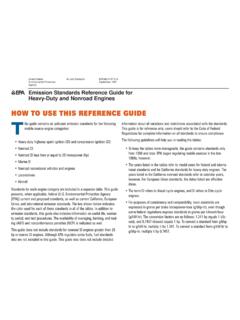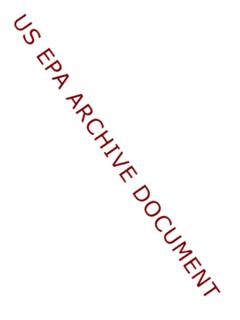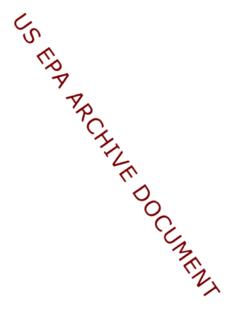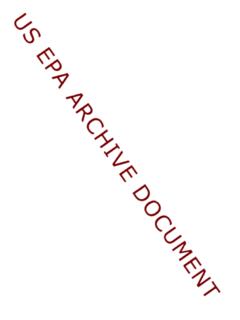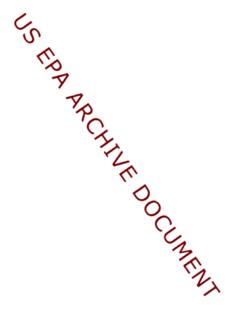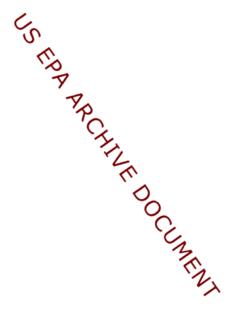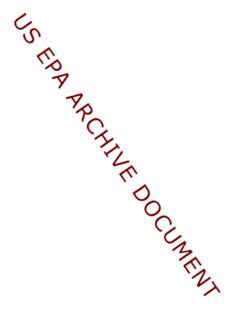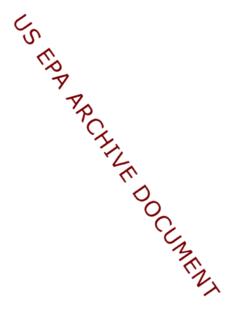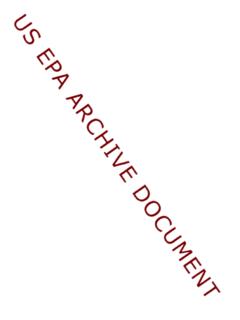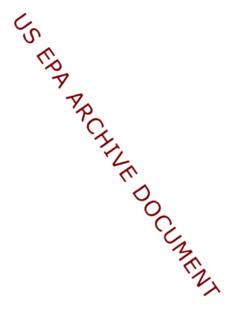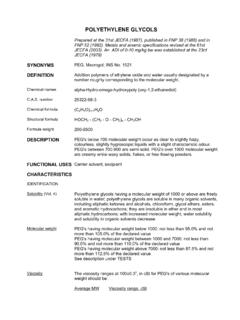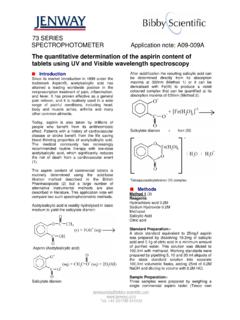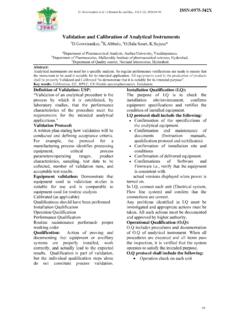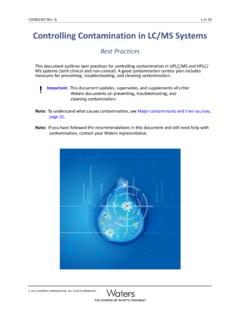Transcription of Soil Sampling Standard Operating Procedure: August 1997 ...
1 Title: soil Sampling Category: ENV Revised: August 1997 iiSOIL Sampling ecology and environment, inc. 368 Pleasant V ew Dr ve / Lancaster, New York 14086 / (716) 684-8060 Standard Operating PROCEDURE 1997 Ecology and Environment, Inc. TITLE: soil Sampling CATEGORY: ENV REVISED: August 1997 None of the information contained in this Ecology and Environment, Inc., (E & E) publication is to be construed as granting any right, by implication or otherwise, for the manufacture, sale, or use in connection with any method, apparatus, or product covered by letters patent, nor as ensuring any one against liability for infringement of letters patent.
2 Anyone wishing to use this E & E publication should first seek permission from the company. Every effort has been made by E & E to ensure the accu racy and reliability of the information contained in the document; however, the company makes no representations, warranty, or guarantee in connection with this E & E publication and hereby expressly disclaims any liability or responsibility for loss or damage resulting from its use; for any violation of any federal, state, or municipal regulation with which this E & E publication may conflict; or for the infringement of any patent resulting from the use of the E & E publication. TITLE: soil Sampling CATEGORY: ENV REVISED: August 1997 TABLE OF CONTENTS Section Page 1.
3 Introduction .. 1 2. Scope .. 1 3. Method 1 4. Sample Preservation, Containers, Handling, and 1 5. Potential 2 6. soil Sampling Equipment .. 3 Geophysical Equipment .. 5 7. Reagents .. 5 8. procedures .. 5 Office Preparation .. 5 Field Preparation .. 6 Representative Sample Collection .. 6 Sampling Approaches .. 6 Surface soil Samples .. 10 Sampling at Depth with Augers and Thin-Walled Tube Samplers.
4 11 Sampling at Depth with a Trier .. 13 Sampling at Depth with a Split-Spoon (Barrel) Sampler .. 14 Test Pit/Trench 15 Sample Preparation .. 16 Sample Quantity and 16 Sample Preservation and Holding Time .. 16 Removing Extraneous Material .. 16 Homogenizing Samples .. 16 Compositing Samples .. 20 Splitting Samples .. 20 iii TITLE: soil Sampling CATEGORY: ENV REVISED: August 1997 Post-Operations .. 20 Field.
5 20 Office .. 20 9. Calculations .. 20 10. Quality Assurance/Quality Control .. 20 Sampling Documentation .. 21 soil Sample 21 Logbook .. 22 Chain of Custody .. 22 Sampling Design .. 22 11. Data Validation .. 22 Quality Assurance/Quality Control Samples .. 23 Field Duplicates (Replicates).. 23 Collocated Samples .. 23 Background Samples .. 23 Rinsate (Equipment) Blanks.
6 23 Performance Evaluation Samples .. 23 Matrix Spike/Matrix Spike Duplicates (MS/MSDs) .. 23 Field Blanks .. 23 Trip Blanks .. 24 12. Health and Safety .. 24 Hazards Associated with On-Site Contaminants .. 24 13. References .. 24 Appendix A Sampling Augers .. 26 B Sampling Trier .. 27 Split-Spoon Sampler .. 28 iv C TITLE: soil Sampling CATEGORY: ENV REVISED: August 1997 LIST OF TABLES Table Page 5-1 soil Sampling Equipment .. 2 8-1 Representative Sampling Approach Comparison.
7 7 8-2 Standard Sampling Holding Times, Preservation Methods, and Volume 17 v TITLE: soil Sampling CATEGORY: ENV REVISED: August 1997 LIST OF FIGURES Figure Page 8-1 Random Sampling .. 8 8-2 Stratified Random Sampling .. 8 8-3 Systematic Grid 8 8-4 Systematic Random Sampling .. 9 8-5 Search 10 8-6 Transect 10 8-7 Quartering to Homogenized and Split Samples .. 21 vi TITLE: soil Sampling CATEGORY: ENV REVISED: August 1997 1. Introduction This document describes the procedures for the collection of representative soil samples.
8 Representative Sampling ensures the accurate characterization of site conditions. Analysis of soil samples may determine pollutant concentrations and the accompanying risks to public health, welfare, or the environment. 2. Scope Included in this discussion are procedures for obtaining representative samples, quality assurance/quality control (QA/QC) measures, proper documentation of Sampling activities, and recommendations for personnel safety. 3. Method Summary soil samples may be recovered using a variety of methods and equipment. These are de pendent on the depth of the desired sample, the type of sample required (disturbed vs. undis turbed), and the soil type.
9 Samples of near-surface soils may be easily obtained using a spade, stainless-steel spoon, trowel, or scoop. Sampling at greater depths may be performed using a hand auger; a power au ger; or, if a test pit is required, a backhoe. All Sampling devices should be cleaned using pesticide-grade acetone (assuming that ace tone is not a target compound) or methanol, then wrapped in clean aluminum foil, and custody sealed for identification. The Sampling equipment should remain in this wrapping until it is needed. Each sampler should be used for one sample only. However, dedicated tools may be impractical if there is a large number of soil samples required.
10 In this case, samplers should be cleaned in the field using Standard decontamination procedures as outlined in E & E s Standard Operating Procedure (SOP) for Sampling Equipment Decontamination (see ENV ). 4. Sample Preservation, Containers, Handling, and Storage The chemical preservation of solids is not generally recommended. Refrigeration is usu ally the best approach, supplemented by a minimal holding time. soil samples should be handled according to the procedures outlined in E & E s SOP for Sample Packaging (see ENV ). 1 TITLE: soil Sampling CATEGORY: ENV REVISED: August 1997 5. Potential Problems Potential problems with soil Sampling include cross-contamination of samples and im proper sample collection.
